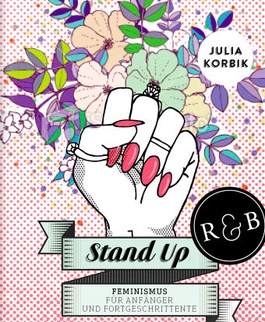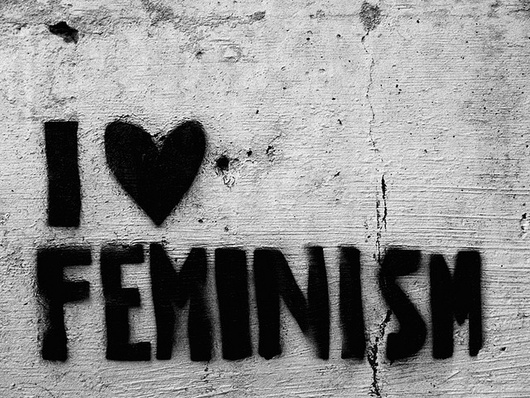
Stand Up! Why feminism is important for everyone
Published on
Translation by:
 Danny S.
Danny S.
"I'm a feminist. What of it?" For many women and men this F-word generates a lot of controversy -- aren't we all equal? Julia Korbik, journalist and Babelian since 2009, has a different view. Because she can not only compellingly speak about feminism, but can also write effectively about it, she has now published a book: "Stand Up! Feminismus für Anfänger und Fortgeschrittene."
A slightly warmer than average early Summer evening on a Kreuzberger roof terrace. The ladies lean against the railing holding bottles of beer, while the men casually stand in the corner. Out of the speakers comes electronic music, and as the sun slowly descends behind the jagged roofed landscape, beer bottles and earrings aren't the only thing to flare up. Those who wish to ruin this picturesque Berliner moment in one stroke need only to drop the F-word. After all, it would surely strike these casual evening discussions like a bomb: "Many people equate feminism with misandry. But why should feminists abhor men? That's complete nonsense! It's about making society a better place -- for men and women." Julia Korbik has experience with roof terraces, gender discussions and the explosiveness of feminism. But why has it become so unsexy to designate oneself as a feminist? "Feminism has never really been seen in a good light. Even the suffragtes weren't liked by anyone!" Julia laughs.
F-Word or claim for Freedom?
 Because Julia isn't indifferent to discussions about men, women and societal structures, and because she's not afraid to make her opinions known among beer and terrasse railings, she's dealt with the topic of feminism for the past couple of years. In the meantime she's been designated an expert in the field, which demonstrated in her first book Stand Up! Feminismus für Anfänger und Fortgeschrittene ("Stand Up! Feminism for beginner and intermediate levels", 2014). Julia has wondered for a long time why it's not just men, but also women, who respond so allergically to feminism, for which they have much to be thankful for. "For many young women, feminism seems to be too abstract. On TV you typically only see Alice Schwarzer who often talks about prositution and human trafficking. These are topics that don't directly affect most young women." But for men, the only thing that immediately comes to mind is FEMEN: "But that is almost a bit off topic. What is remembered of FEMEN are naked breasts. No one really knows what was written on them."
Because Julia isn't indifferent to discussions about men, women and societal structures, and because she's not afraid to make her opinions known among beer and terrasse railings, she's dealt with the topic of feminism for the past couple of years. In the meantime she's been designated an expert in the field, which demonstrated in her first book Stand Up! Feminismus für Anfänger und Fortgeschrittene ("Stand Up! Feminism for beginner and intermediate levels", 2014). Julia has wondered for a long time why it's not just men, but also women, who respond so allergically to feminism, for which they have much to be thankful for. "For many young women, feminism seems to be too abstract. On TV you typically only see Alice Schwarzer who often talks about prositution and human trafficking. These are topics that don't directly affect most young women." But for men, the only thing that immediately comes to mind is FEMEN: "But that is almost a bit off topic. What is remembered of FEMEN are naked breasts. No one really knows what was written on them."
 Julia is convinced that the general message of feminism is still relevant. "Feminism is the belief, that all people deserve the same rights regardless of gender. That's why feminism is a political movement that aims to bring about social as well as personal change." In Stand Up! Julia calls this the "ultimate weapon against the system," which not only oppresses women, but also men. Is feminism then the liberation not only of feminine but also masculine genders? Those who believe they have heard wrongly should read part one of Stand Up! "The partiarchy as the hegemony of fathers doesn't, of course, exist anymore. Today it simply means that men have the say in society. These are structures that have existed for thousands of years and that can't quickly be done away with."
Julia is convinced that the general message of feminism is still relevant. "Feminism is the belief, that all people deserve the same rights regardless of gender. That's why feminism is a political movement that aims to bring about social as well as personal change." In Stand Up! Julia calls this the "ultimate weapon against the system," which not only oppresses women, but also men. Is feminism then the liberation not only of feminine but also masculine genders? Those who believe they have heard wrongly should read part one of Stand Up! "The partiarchy as the hegemony of fathers doesn't, of course, exist anymore. Today it simply means that men have the say in society. These are structures that have existed for thousands of years and that can't quickly be done away with."
"Power is clearly masculine" - right?
That's why one has to be patient with societal changes. "It's not so long ago that women received the right to vote, the right to work and to get an abortion." While women fought for basic rights, which have had for such a long time that we almost can't remember what it was like before, the power structures have largely stayed the same. With the provocative thesis "power is clearly masculine," Julia scrutinizes the politically correct debates around soft power and the female quota: "Women still have to fit into a masculine conception of power. Either one is super feminine and uses that quality to run a business, or one acts markedly masculine. Why isn't there something in between?" The hypermasculinity of managers, however, overstrains many men too, and when the German chancellor is described as "Mutti" (mommy), it clearly sounds derogative.
Why do we need feminism? Summary of Stand Up! by Julia Korbik.
Those who take their time turning the pages of Stand Up!, which was designed by graphic designer Chrish Klose, will not only find to their surprise that sexual harrassment in the workplace has only been a statutory offence since 1994, but will also discover young activists and bloggers such as Theresa Bücker and the Turkish German Kübra Gümusay, whose writings fascinate Julia. Historical and theoretical explanations are interrupted with short biographies and quotes. "We don't want Stand Up! to become a barren landscape of words, but rather that everyone can take their time absorbing the information. One doesn't have to read every footnote or follow each internet link," explains Julia.
We need more feminist power in our everyday lives!
The topics in the book range from gender pay gap and sexism to the masculinist movement, the female quota and the much bemoaned masculinity crisis. Julia thinks the "debate over the modern man in pain," in which feminists are often used as a scapegoat, is strained: "Crisis is the wrong word. Ultimately it's just a normal adjustment process. It reveals more than anything that we're still stuck in old gender role patterns. Why do we laugh about a guy who plays guitar and isn't confindent enough to approach a woman? I can only ask myself: why doesn't she do it herself?" Such debates are part of the general crisis of our generation. "It's not just about gender roles. When you have as many opportunities and options as you do today, it will naturally be difficult to find yourself - as a man and as a woman. Feminism can definitely help with this, because it teaches how to accept oneself for just the way one is."
 In order to prevent the message of Stand Up! from getting lost when one has read the book all the way through, Julia gives 12 concrete tips for feminism in our everyday lives. "What practical steps should be taken and where are things going in the wrong direction? For me it's about everday behaviors that one might not even think are feminist in nature. One doesn't have to immediately join a political party or try to revolutionize the system." After all, feminism is a position relating to "feminist power in our everyday lives". It doesn't only pertain to modern flirting tips nor housework, but rather, for example, about being active in democractic decision-making processes. That is why "Go voting!" is one of Julia's 12 tips. But that doesn't, of course, mean that one shouldn't occasionally stir up boring party discussions with the F-word-bomb. Nor that one should be upset if feminism gradually loses some of its explosiveness.
In order to prevent the message of Stand Up! from getting lost when one has read the book all the way through, Julia gives 12 concrete tips for feminism in our everyday lives. "What practical steps should be taken and where are things going in the wrong direction? For me it's about everday behaviors that one might not even think are feminist in nature. One doesn't have to immediately join a political party or try to revolutionize the system." After all, feminism is a position relating to "feminist power in our everyday lives". It doesn't only pertain to modern flirting tips nor housework, but rather, for example, about being active in democractic decision-making processes. That is why "Go voting!" is one of Julia's 12 tips. But that doesn't, of course, mean that one shouldn't occasionally stir up boring party discussions with the F-word-bomb. Nor that one should be upset if feminism gradually loses some of its explosiveness.
Julia Korbik: Stand Up! Feminismus für Anfänger und Fortgeschrittene, Rogner&Bernhard, 416 Pages, 22,95 Euro.
Get regular updates from Julia on Twitter: @FrauKorbik
Translated from Stand Up! Warum der Feminismus alle angeht


